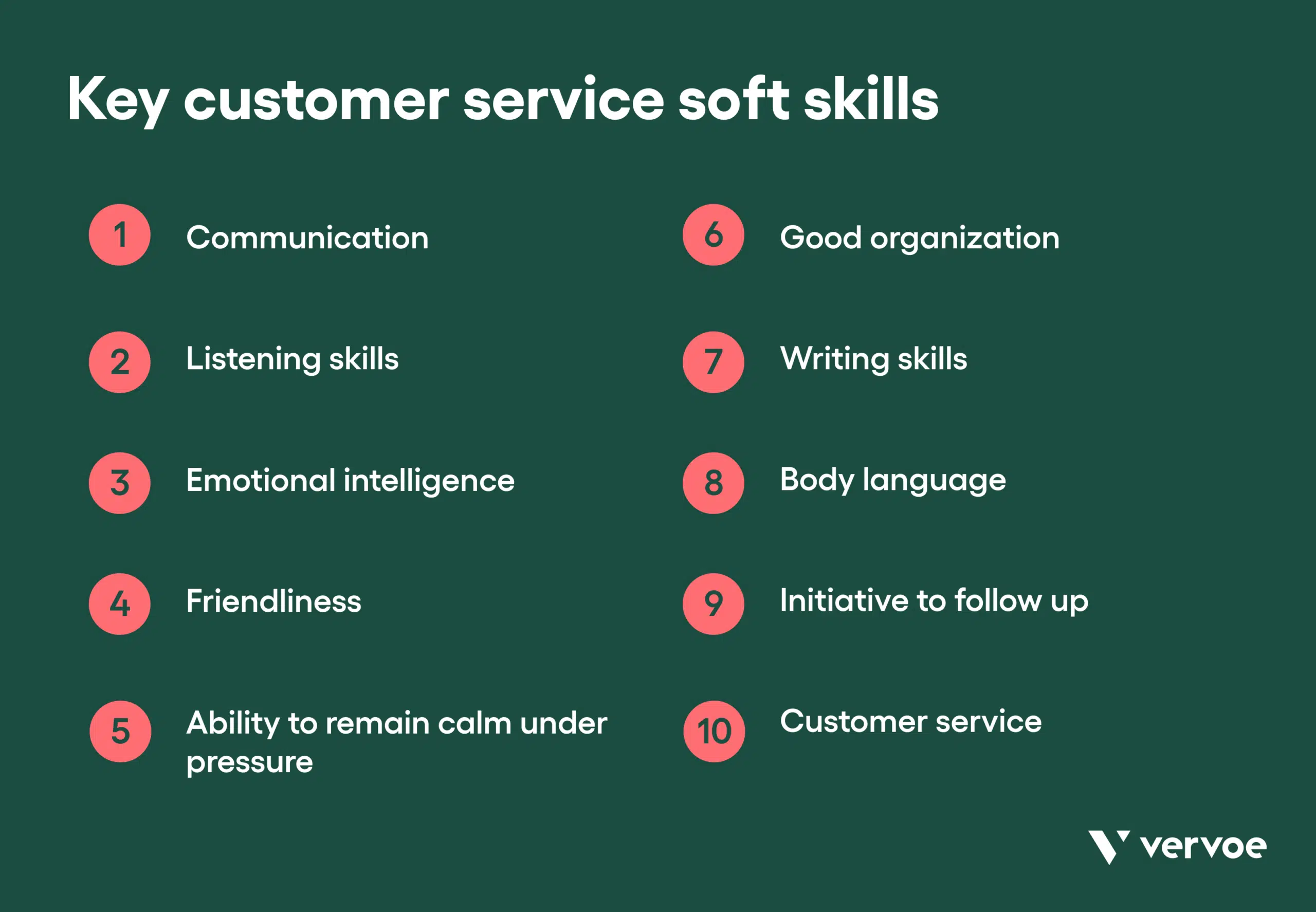So, you think you’ve found an ideal candidate for a customer service role? They’re highly experienced in data entry, have plenty of industry knowledge, and can expertly work their way around a point of sale (POS) system. They even have a track record of consistently hitting sales goals.
The thing is, the candidate seems to be lacking when it comes to more intangible customer service skills. They aren’t very friendly, they’re disorganized, and it’s clear that they have trouble remaining cool under pressure. Plus, despite their apparent successes in the field of customer service, they aren’t that good at communicating.
This is a clear case of a candidate excelling when it comes to relevant customer service hard skills, such as technical knowledge and training, but falling short in regards to customer service soft skills.
It’s a situation that many HR professionals and business owners find themselves in when hiring for customer service roles or evaluating their existing team’s skill set. But while it’s relatively common, this imbalance between key hard skills vs. soft skills shouldn’t be ignored.
In order to hire well-rounded customer service professionals, you need to ensure that they possess customer service soft skills and hard skills. Simply put, the importance of soft skills in customer service should not be underestimated.
If you’re wondering why keep reading. In this guide, we’ll outline what soft skills are and why they’re important for customer service. We’ll also provide you with a soft skills list for customer service that highlights the most vital ones your team should master.
What are soft skills?
Soft skills are the name given to any non-technical, interpersonal attributes that impact both how employees perform work duties and the way in which they interact with others. Unlike hard skills, which are tangible and easier to measure, the intangibility of soft skills can make them tricky to assess.
Soft skills are often described as innate human qualities that can be leveraged in the workplace. While personality and upbringing can affect which ones a person possesses, they can also be developed through experience and training.
Why are soft skills important in customer service?
Soft skills are important in customer service because they equip customer service professionals with the desirable behaviors and attitudes they need to expertly navigate the ins and outs of their roles.
As you’ll discover, customer service soft skills empower your customer service team to perform their jobs in a way that produces better results for your customers and business alike. So it’s hardly surprising that more and more companies are recognizing the importance of these skills when hiring and training employees.
If you’re wondering what are soft skills in customer service, we’ll cover this in detail in the next section.
[Read more: 18 Key Customer Service Skills and How to Hire For Them]
Customer service soft skills examples
Ready to learn about the best soft skills for customer service to look for in candidates and employees? We’ve highlighted the top ten soft skills customer service examples hiring managers and business owners should be mindful of.
Our soft skills list for customer service is also a handy resource for customer service professionals themselves, whether they want to learn how to relate customer service experience with soft skills, or discover the most likely customer service soft skills phrases they’ll hear in interviews.
1. Communication
If you search for customer service soft skills tips online, communication is usually right at the top. The reason that it’s such a valuable customer service soft skill for your team to master is that it grounds everything customer service professionals do.
The ability to communicate clearly allows your team to build and maintain positive relationships with one another, as well as with customers. It also leads to better results. Around 97% of employees say that communication impacts their task efficacy levels, according to CMSWire. And 86% of employees and executives blame lack of collaboration or ineffective communication for workplace failure, according to Fierce, Inc.
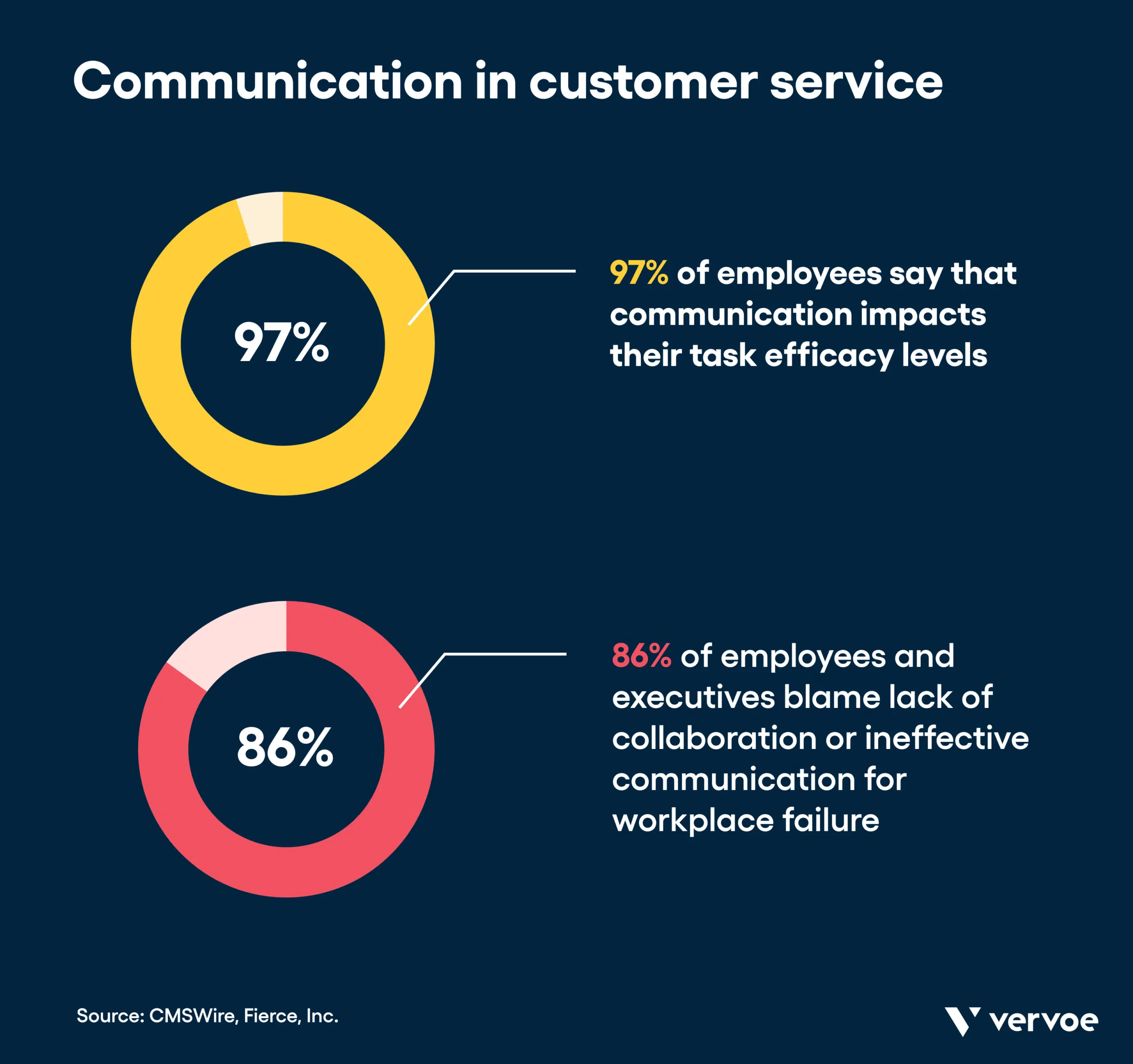
So what exactly does effective communication look like in a customer service environment?:
- Active listening
- Speaking slowly, clearly, and concisely
- Offering clear explanations
- Repeating explanations for clarity and understanding
- Summarizing relevant details
The same rules apply even if your team is using written communication to engage with customers. Just make sure that they also learn to develop their writing skills, which is another important customer service soft skill we touch on further below.
2. Listening skills
Listening skills are one of the most misunderstood customer service soft skills. Many customer service professionals, particularly those new to the industry, equate listening skills with the simple act of hearing what customers are saying.
However, true listening skills involve what is referred to as ‘active listening’. Active listening is described as being totally focused on the words that the customer is saying, understanding what those words mean, and responding in a manner that validates what they’re saying. It allows customers to feel genuinely heard, understood, and served.
Another reason active listening is so important as a soft skill for customer service is that customer loyalty is tied to active listening. Apptentive has found that 97% of consumers are more likely to maintain loyalty to a brand that implements changes based on their feedback. It’s a bonus that active listening also provides you with the data you need to make user research-based product improvements.
3. Emotional intelligence
When it comes to customer service soft skills activities, the impact of emotional intelligence cannot be understated. Emotional intelligence describes “the ability to perceive, control, and evaluate emotions”. It’s a vital customer service soft skill because it enables customer service professionals to build authentic and trust-based connections with customers.
Communications coach Bruna Martinuzzi highlights that possessing emotional intelligence enables customer service professionals to harness many key skills related to high levels of customer service, such as:
- Self-awareness: The awareness of how they come across to others
- Awareness of others: The ability to sense how others feel during an interaction
- Empathy: The ability to put themselves in the customer’s shoes
- Self-management: The ability to manage the stress of emotional labor and be more relaxed
4. Friendliness
We all have at least one experience burned into our memory of when we needed to engage with a rude or negative-sounding customer service professional. We can also all recall a time when we encountered a customer service professional who was friendly, courteous, and enthusiastic.
Your customers are no different. When they look back on their customer service experience with your company, research has found that your team’s attitude will be at the forefront of their minds. For example, a study by PwC highlights that 80% of American consumers identified friendly service, along with speed, convenience, and helpful employees, as one of the most important elements of a positive customer experience.
A study by Oracle further cements the importance of friendliness as a customer service soft skill. According to the study, 73% of consumers believe that friendly customer service representatives and employees are what makes a memorable experience that causes them to stick with a brand.
5. Ability to remain calm under pressure
Customer service professionals need to deal with all manner of problems — and personalities — day in and day out. It’s one of the things that make customer service an equally thrilling and challenging profession.
In order for your customer service team to perform well, employees need to be able to remain calm under pressure. There are two main reasons for this. Firstly, the ability for employees to manage their emotions and remain calm under pressure has a direct link to their performance.
Secondly, if your team struggles to remain calm under pressure, their stress levels will spike. This is concerning not only because stress has an adverse impact on employees’ mental and physical health, but also because it’s associated with higher rates of absenteeism and higher financial costs for businesses.
6. Good organization
Getting customer service right requires the ability to manage many moving parts. Your team needs to stay on top of an ever-growing mountain of customer service tasks, many of which can be complex and time-consuming.
- Attention to detail
- Time management
- The ability to identify problems
- Managing appointments
- Prioritization
- Productivity
- Situational assessment
- Task analysis
- Goal setting
- Self-motivation
- Managing conflict
- Meeting deadlines
- Responsibility
As you can see, organizational skills feed into many other interrelated skills which customer service professionals need. So it’s no wonder that customers generally place a high value on good organization skills. According to a 2019 study, 74% of people have stopped dealing with a company and moved to a competitor due to feeling the company was disorganized.
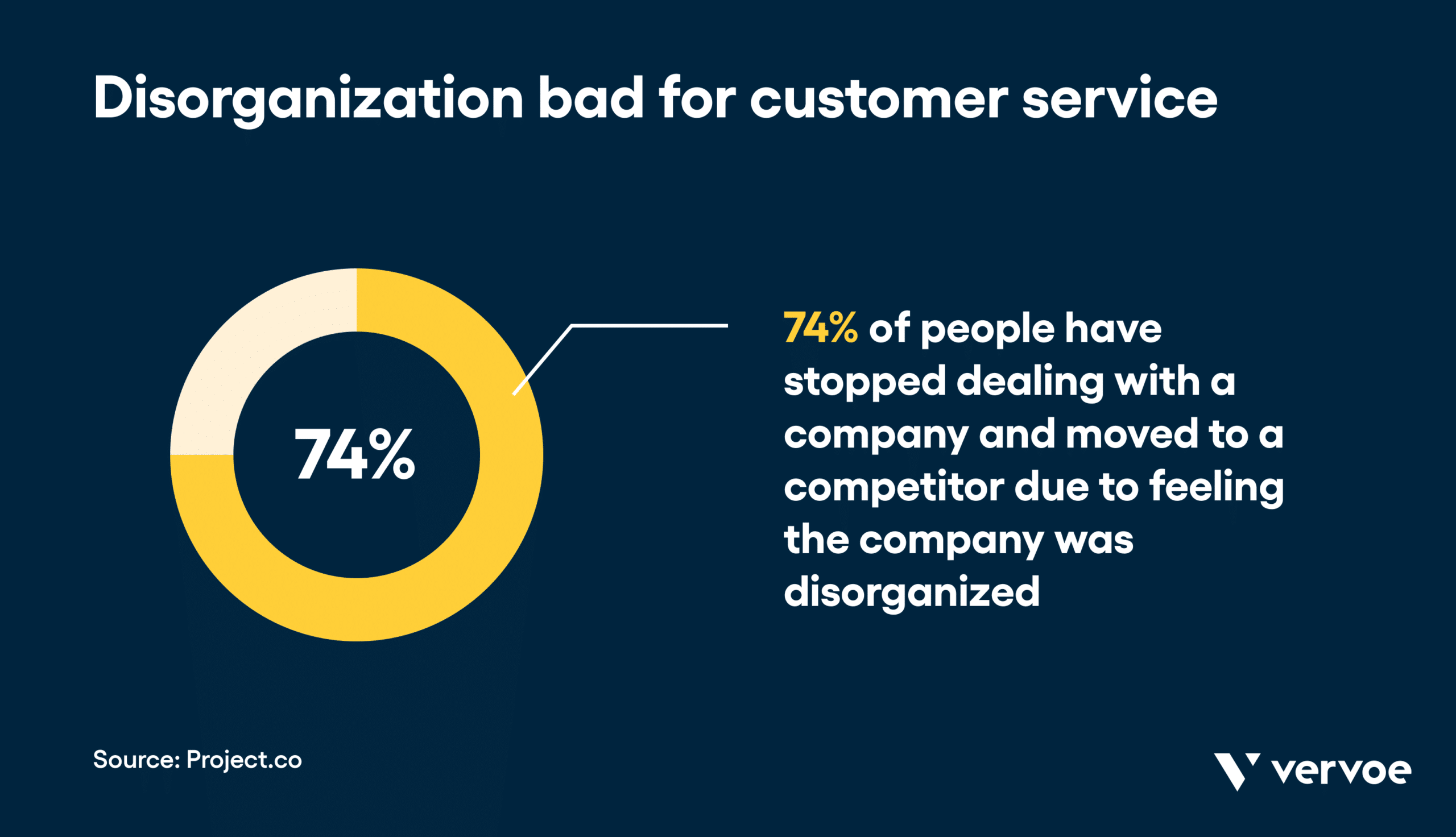
7. Writing skills
With social media usage continuing to increase, a growing number of customers are turning to social media channels to contact customer service. According to research conducted by Microsoft, 35% of American consumers reached out to a business over social media at some point in 2017.
Customers are also taking advantage of other online means of contacting customer support, with an estimated 66% of companies seeing an increase in tickets and service requests from digital channels.
This has made writing skills an essential customer service soft skill to possess. Whether your customer service team is engaging with customers via social media, email, or your virtual help desk software, they need to know how to respond to their questions, complaints, and feedback in a professional, timely, and meaningful manner.
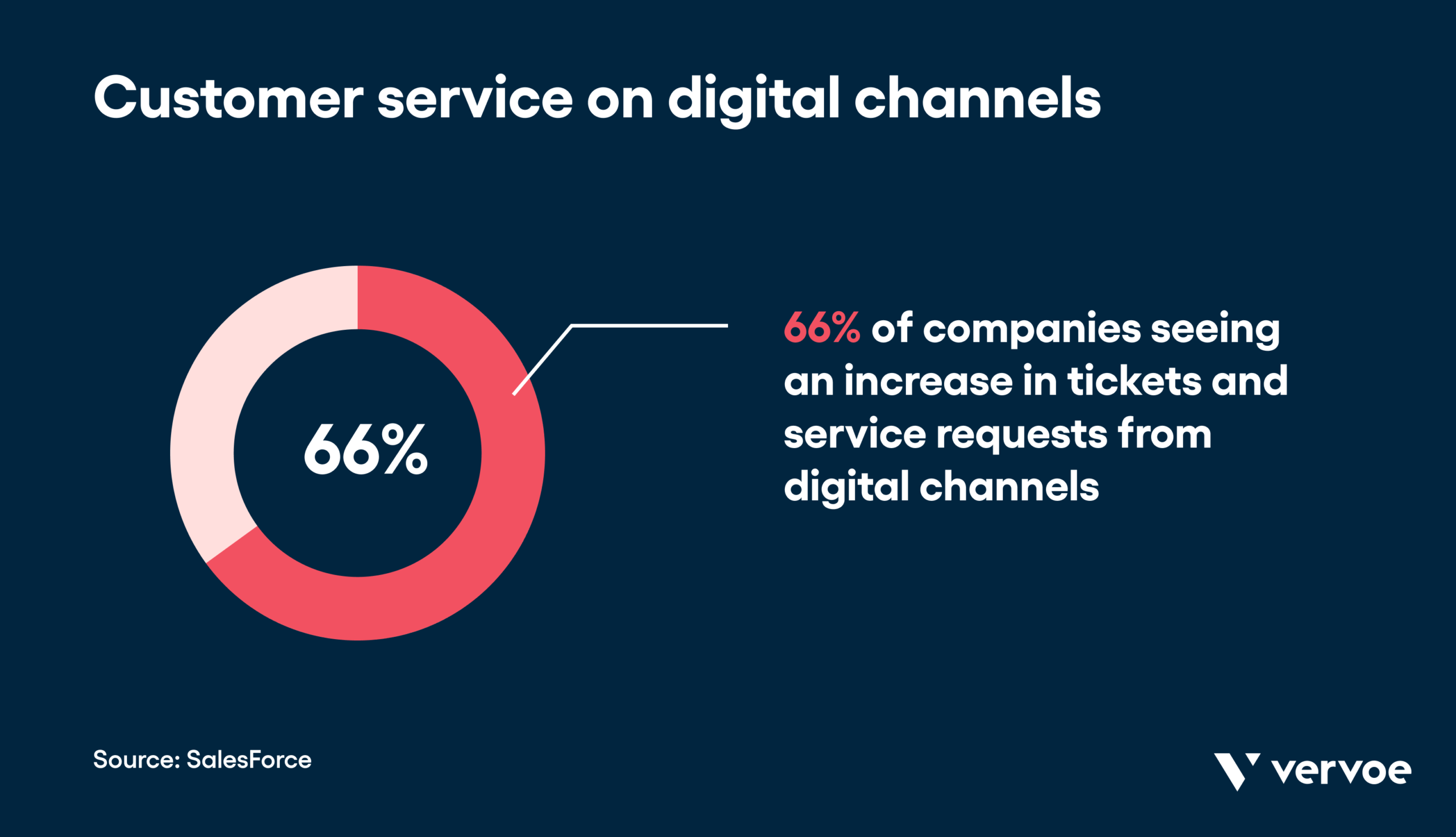
8. Body language
Of course, not all customer service interactions are in written form. Performed virtually or in the flesh, face-to-face interactions are still a crucial part of many companies’ customer service strategies.
Considering that at least 70% of communication is non-verbal, your team can’t only rely on their verbal communication skills to ensure effective face-to-face interactions with customers. They also need to demonstrate strong non-verbal communication skills through their body language.
Some simple body language tips your team should be practicing when engaging with customers face-to-face include:
- Smiling when they greet or talk to customers
- Maintaining eye contact
- Sitting or standing up straight when talking with customers
- Not crossing their arms or legs
- Relaxing their shoulders
9. Initiative to follow up
Following up after a customer interaction seems like a standard step to take in your customer service process. But successive studies have shown this is an area that customer service teams continue to fall short on.
A customer survey by SuperOffice finds that 97% of companies do not send follow-up emails to customers to see if they are satisfied with their response. Worse still, 62% of companies don’t respond to customer service emails in general. Considering that the same study finds that only 20% of companies are able to answer questions in full on the first reply, it’s easy to see why it’s so important for your team to possess the initiative to follow up.
Another reason this customer service soft skill is so critical is that following up allows for any outstanding problems to be resolved. It also allows for the customer experience to continue or end on a positive note. It’s worth keeping in mind that when faced with poor customer service, 31% of people may never use the offending company again, according to a study by NewVoiceMedia.
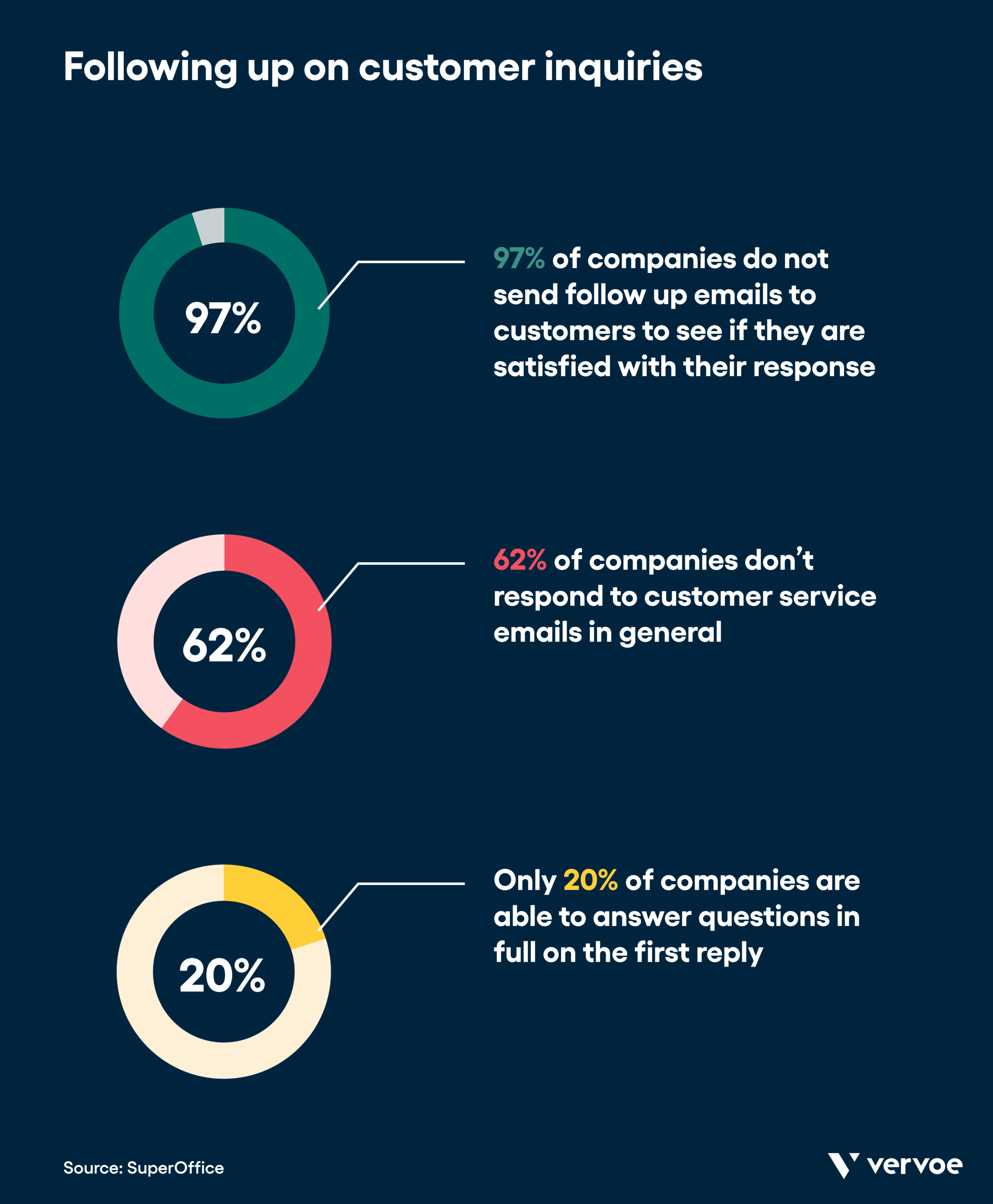
10. Customer service
It makes sense that customer service is one of the top skills customer service professionals should master. Customer service as a skill refers to the command of practices and procedures that aim to improve all interactions between a business and its customers.
This makes it critical to performing all roles in this field. As Connie Edler, Founder, and CEO of Peak 10 Skin puts it, excellent customer service is “the personality of the company and the reason customers come back”.
But is customer service a soft skill? The answer isn’t as clear-cut as you may first think. If you search for customer service soft skills definitions, you’ll see that most experts agree that customer service is indeed a soft skill. However, there are some experts who argue that it should be referred to simply as a typical skill, as calling it a soft skill makes it “almost impossible to train and manage”.
[Read more: 8 Vital Customer Service Hard Skills Your Representatives Need]
Final thoughts
By now, you should have a solid understanding not only of the importance of soft skills in customer service, but also what the most vital soft skills in customer service are.
If you’re planning to expand your team of customer service professionals, this guide will be an invaluable point of reference. It shines a light on critical customer service soft skills to be mindful of when hiring customer service professionals.
It may also prove to be an eye-opener for those wishing to strengthen their existing soft and hard skills for customer service teams. If your team is lacking in customer service soft skills, consider offering customer service soft skills training.
According to the vice president of human resources for CareerBuilder, Liz Cannata, “Companies have a lot to gain by treating soft skills as they would any technical skill”. For best results, she recommends flexible, shorter, and more frequent soft-skills training methods.
If you ever need a reminder of how important soft skills are for your team to master, revisit this guide to read about the many research-backed benefits they offer your customers and business.


